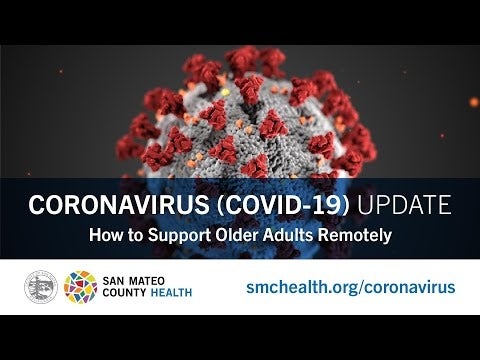Items to include in this newsletter
Inclusive Virtual Community Engagement: New Section in Our Planning for Health Toolkit
The COVID-19 pandemic has placed significant limitations on how we conduct community engagement, creating the need for virtual opportunities that allow communities to participate in planning and policy processes impacting their lives. Check out our latest update to our Community Engagement Toolkit which includes a new section on emerging practices and strategies for implementing inclusive virtual engagement that expands access for our highest need communities facing barriers to technology.
Digital Divide Data: New Maps & Charts on the Get Healthy SMC Portal!
Fast and reliable internet is critical to accessing information and staying connected to people. Broadband internet is a type of fast internet that runs through cables versus dial-up internet that typically uses phone lines. Households with access to broadband internet can quickly utilize online services such as telehealth, teleworking, and education – which are critical to most people’s daily lives these days. You can now see the latest local indicator for broadband internet access in the Health Neighborhoods Data Portal.
How to Support Older Adults Remotely
Here are ways we can practice social distance and support older
adults during this time.
English
video | Spanish video |
Chinese
video | Tagalog video
Boards and Commissions Vacancies
City of San Bruno: There is a recruitment notice for two vacant seats on the Traffic Safety & Parking Commission and one vacancy on the Planning Commission. Residents be can apply here: Traffic Safety & Parking Commission or Planning Commission.
Eviction Moratorium Extended Through August
On July 21st, the Board of Supervisors approved an extension of the eviction moratorium through August 31st, 2020. Governor Newsome extended the authorization to local governments to enact evictions moratoriums until the end of September. This will provide at least temporary housing stability to residents impacted by the COVID-19 pandemic.
Housing Policy Tracker: Updated Home for All Data Available
As more local jurisdictions explore a wide range of housing policies to bring more housing stability in these uncertain times, Home for All updated its housing policy tracker to make policy deliberations easier for our local partners. The updated tool includes short-term rental policies and it updated the other wide range of policies that will help jurisdictions increase and preserve the number of affordable units as well as protect tenants’ rights.
RFP for Volunteer Management Services for the Phoenix Garden is Due August 3rd
San Mateo County Health is currently accepting proposals for volunteer management services for the Phoenix Garden. The Phoenix Garden is a Permaculture Garden located adjacent to the San Mateo County Youth Services Center. The garden will be home to various learning labs, educational and treatment programs, open nature areas and public meeting spaces.
San Mateo Food System Alliance Network Manager RFP
San Mateo County Health is preparing to release an RFP for the Network Manager Services for the San Mateo County Food System Alliance on August 1st. Learn more about the San Mateo County Food System Alliance at their website. Check the Get Healthy SMC website after August 1st for the RFP.
CA Governor Provides Guidance for Reopening Schools
The COVID-19 pandemic has upended all aspects of our daily life, and education is no different. San Mateo County schools continue to work diligently with SMC Health and the California Department of Education to identify the safest way to resume education in the fall. On Friday, July 17th, Governor Newsom provided the Pandemic Plan for Reopening.
Restorative Justice Practices Training Instead of Law Enforcement at Schools
State Superintendent of Schools, Tony Thurmond, convened the Taskforce on Safe Schools to revisit the role of law enforcement on school campuses. The purpose of the Taskforce on Safe Schools hearing was to address these issues on a statewide level and within the context of equity and racial justice. This comes at a time when many communities are asking their districts to reconsider the role of police in education.
San Mateo County Board of Supervisors Provides Funding for Childcare Programs
Childcare providers across San Mateo County and beyond have been severely impacted by the COVID-19 pandemic. On Tuesday, July 21st the San Mateo County Board of Supervisors voted to provide $2 million to support local childcare providers. The funds will establish a new Child Care Relief Fund. The purpose of the Fund is to help providers remain open, particularly those in areas of the county serving low-income families and to ensure working families have access to quality child care.
CCCS Top Priorities for Action to Advance Racial Justice
With an unwavering commitment and urgency to see real and lasting change in our systems and structures that is critical to ensuring a bright and successful future for our children, CCCS partners across the County have been actively engaged to identify their top priority actions for advancing racial justice:
The San Mateo County Immigrant Relief Fund
San Mateo County is providing critical financial support to undocumented immigrants who have been impacted by COVID-19 and who have been denied access to CARES Act funding. Eligible residents can receive up to a $1,000 grant through the San Mateo County Immigrant Relief Fund. This assistance is critical for the many essential workers who do not have access to federal resources, but have lost income or their jobs and face greater risk of exposure to the novel coronavirus.
Renaissance Entrepreneurship Center Continues Entrepreneurship Program in San Mateo County
Over the past year, Renaissance Mid-Peninsula, a Get Healthy SMC community partner, continued their programming to support entrepreneurship and economic mobility of low-income residents in San Mateo County with a focus in North County, by providing: 1) business planning and financial literacy classes, 2) personal coaching, and 3) marketing and sales activities, delivered in both English and Spanish. In 2019 alone, Renaissance Mid-Peninsula served 402 clients, resulting in 76 new businesses and 114 total new jobs. REC has als
Teacher Pipeline Project – A Career Development Opportunity and Care Community
The Community Equity Collaborative is organizing collaborative cohort-based early childhood education workforce development initiatives in North County that integrates online courses from Skyline College with community-based resources. The teacher pipeline program was developed in 2018 after an assessment found a gap of 2,500 teachers by 2025.









